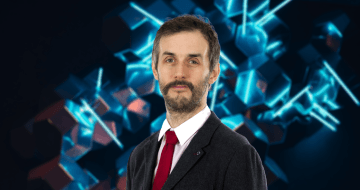Pinsent Masons senior associate Meghan Higgins on the importance of pro bono and the skills it teaches junior lawyers

In the midst of a cost-of-living crisis and following years of increased need for accessible legal services around the world, Pinsent Masons launched a regenerated pro bono programme in May of last year, providing free legal advice to organisations and individuals who could not otherwise access it. Meghan Higgins is a senior associate in the firm’s tech disputes practice — since July, she has been on secondment to their pro bono team, investing in pro bono partnerships and identifying projects for the firm to support.
“At Pinsent Masons we have a well-established community investment programme that many of our employees are involved in,” Higgins tells me. “We have long-standing relationships with partner schools and support a variety of other community initiatives. However, historically, pro bono hasn’t been a key part of our global strategy.” She goes on: “Our pro bono work in the past has been driven by individual lawyers on a more ad hoc basis. We are now investing in structuring our pro bono programme so we can get involved with larger projects around the world and get more of our employees involved.”
As well as a more strategic approach to pro bono work, Pinsent Masons’ new and improved pro bono programme encourages lawyers and other business professional to give 25 hours of their time each year to the firm’s pro bono causes. “It’s a really exciting time to get involved and support the programme,” Higgins enthuses. “Because I’ve always had such positive experiences with pro bono and we are learning about so many worthwhile initiatives around the world, there are a lot of ideas across the business for projects we could support,” she adds.
Higgins’ career began across the pond in California, where she qualified as a lawyer, working at a multinational commercial law firm as well as for the San Francisco City Attorney’s Office. “Pro bono is a larger part of life as a lawyer in the US,” she explains. “Because there is no legal aid funding outside of the criminal justice system, there is an expectation that lawyers will spend a portion of their time pro bono.”
This work made a significant impression on Higgins early in her career:
“I did my first pro bono case as a first-year associate,” she says. “I applied for asylum on behalf of a political activist who had come to the US from Togo, putting together documents, drafting statements and preparing my client for interview. My client was granted asylum and could bring his family to the US and find employment. I kept in touch with him while I was living in San Francisco. It was amazing to see how access to legal advice brought about this change in his circumstances.”
Higgins is keen to get other lawyers involved in experiences like this. “Most lawyers who have been involved with pro bono work will say that they have found it really rewarding,” she says, adding, “It’s very empowering learning how your legal knowledge and skills can be used to help others. Being a lawyer is a very powerful thing.”
“Junior lawyers in particular love working on pro bono matters,” says Higgins, “it’s an opportunity for them to take on more responsibility early in their careers and build their skills.” One such skill is interviewing clients and asking questions about their legal issues. Higgins recalls, “I was with a group of trainees at a legal advice clinic recently where we had members of the public speaking to us about disputes with their family or their employment issues.” For disputes lawyers like Higgins, learning to interview clients and ask difficult questions is a crucial skill. “One of the most interesting aspects of litigation is fact finding, trying to get to the bottom of what really happened. Pro bono is a great vehicle to develop this skill,” she says.
Learning to be a good listener is a skill which is occasionally overlooked in the legal profession, Higgins tells me. She reflects on a piece of advice she received from a mentor while she was preparing to take her first deposition: “Not everyone will tell a story in the same way that you would. The same events can impact people differently, so you need to listen and ask questions, rather than jump to your own conclusions about what happened.” This may not come naturally to some lawyers, she acknowledges: “Part of being a lawyer is projecting confidence to your client, because they are relying on you and your advice. It can be difficult to explain to a client that there may not be a clear answer to their question or issue.. However, especially in litigation, you never have all the answers. Listen, have an open mind and put yourself in the shoes of the person you’re speaking with.”
In addition to its developing work with legal clinics, Pinsent’s provides pro bono support to several climate-focused research projects and supports a range of charities and non-profits with specific project-related needs or with day-to-day legal advice. “We try to align our pro bono work with our broader objectives as a responsible business, which include inspiring young lives and supporting sustainability and fighting climate change,” Higgins says. “However, we also want our employees to support causes that matter to them so we are keen to support other pro bono projects as well.”
A particular pro bono highlight for Higgins at Pinsents has been advising a rewilding charity in a potentially contentious issue with one of its suppliers. Describing this matter, she tells me, “Working closely with and getting to know the client’s team was really inspiring. . They are doing so much good in improving biodiversity and fighting climate change. We learned a lot about rewilding initiatives in the year that we worked with them and have continued to support them with other legal needs.” Higgins cites this matter as an example of excellent trainee involvement, “We ended up going through an Alternative Dispute Resolution (ADR) process. One of our trainees was very enthusiastic and managed the correspondence with the opposing counsel and submissions to the mediator. She still talks about how valuable this exposure and responsibility was.”
Another initiative Pinsent Masons has been heavily involved with is Kids in Need of Defense (KIND), an organisation providing free legal advice and representation to undocumented children and young people in the UK. “This initiative gets glowing reviews from trainees,” Higgins tells me. “By getting involved with KIND you are making a direct impact on somebody’s life. We also work on this initiative in teams which we staff from across the office so it is a fantastic way to meet other lawyers at Pinsent Masons,” she adds.
Pro bono projects give trainees the opportunity to strengthen their network within the firm, Higgins explains, “As a trainee it’s important that people know who you are. A great way to build your profile in the firm is to support pro bono matters.” This comes along with the chance to get exposure to a variety of work outside of their current seat. “Pro bono is a great way for trainees to work out what kind of work they want to do and what teams they might like to sit in,” says Higgins.
“Our trainees have been fantastic pro bono supporters. They have just launched a pro bono network, sharing information and resources,” Higgins tells me. She continues, “they recognise the increasing need for pro bono advice and are concerned about issues with the environment and the economy.” This need is palpable across the legal industry.
As we wrap up our conversation, Higgins tells me, “I don’t know any lawyers who would suggest that pro bono work is a satisfactory answer to the systemic need for greater access to legal advice and support; it’s definitely a stop-gap measure. However, as qualified lawyers, we can use our skills to help individuals in need and become better lawyers in the process. I am looking forward to helping more lawyers at Pinsent Masons find causes they want to support and get involved with pro bono work.”
Meghan Higgins will be speaking at ‘Pro bono, career development and making a difference — with Pinsent Masons’, a virtual student event taking place on 13 November. Apply now to attend.


